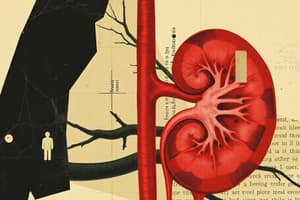Podcast
Questions and Answers
What is the primary mechanism by which kidneys maintain constant renal blood flow despite changes in blood pressure?
What is the primary mechanism by which kidneys maintain constant renal blood flow despite changes in blood pressure?
- Hormonal control
- Autoregulation (correct)
- Nervous system regulation
- Filtration rate adaptation
Within what range of arterial blood pressure can kidneys effectively maintain glomerular filtration rate?
Within what range of arterial blood pressure can kidneys effectively maintain glomerular filtration rate?
- 120-180 mmHg
- 100-200 mmHg
- 80-170 mmHg (correct)
- 50-100 mmHg
What happens to renal blood flow during marked fluctuations in arterial blood pressure?
What happens to renal blood flow during marked fluctuations in arterial blood pressure?
- It fluctuates proportionally
- It decreases significantly
- It is regulated solely by external factors
- It stays relatively constant (correct)
Which statement best describes the concept of autoregulation in the kidneys?
Which statement best describes the concept of autoregulation in the kidneys?
During autoregulation, what is the kidneys' response to fluctuations in arterial blood pressure?
During autoregulation, what is the kidneys' response to fluctuations in arterial blood pressure?
Study Notes
Intrinsic Control of Glomerular Filtration
- Kidneys can maintain renal blood flow and glomerular filtration rate (GFR) despite large changes in arterial blood pressure
- This is known as autoregulation
- Autoregulation ensures that blood pressure fluctuations between 80-170 mmHg do not significantly affect renal blood flow and GFR
Studying That Suits You
Use AI to generate personalized quizzes and flashcards to suit your learning preferences.
Related Documents
Description
This quiz explores the intrinsic control mechanisms of glomerular filtration in the kidneys. Learn how autoregulation helps maintain renal blood flow and glomerular filtration rate despite variations in arterial blood pressure. Test your understanding of this essential physiological process.




